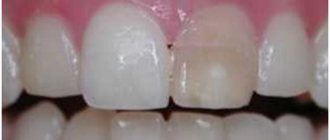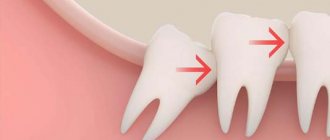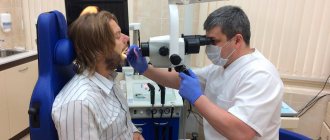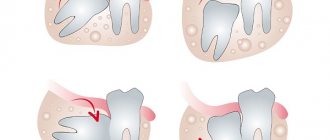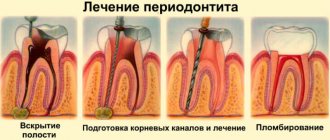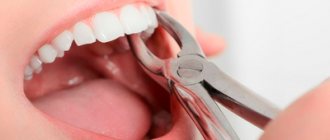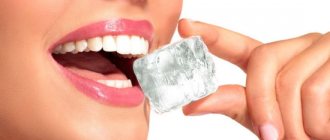Toothache: causes
Under the dental crown in the canals there is a network of blood vessels and nerve fibers.
In this way, the tooth is connected with the rest of the body - its circulatory and nervous systems. The appearance of toothache indicates that the pathological process has reached the nerve, which signals a problem. As you know, pain is only a symptom, the causes of which still need to be known. Therefore, if the dental nerve hurts, then the right solution would be to go to the dentist. Often, when examined by a doctor, one of the following causes of toothache is determined:
- Caries . This is the most common reason for nerve pain. Pathogenic bacteria that inhabit the oral cavity produce lactic acid during their life, which corrodes the enamel. In the initial stages, caries does not cause pain. However, as the enamel is destroyed, the pathological process gets closer to the nerve. If pain occurs during caries, then this indicates an advanced process.
- Pulpitis . This is an inflammation of the internal tissues of the tooth. In fact, pulpitis is an advanced form of caries, when bacteria have eaten away the hard tissues of the tooth and reached the soft ones. The initial stages of pulpitis are characterized by acute pain, which may subside over time. The disappearance of pain indicates that the nerve is killed.
- Periodontitis . This is an inflammatory pathology of periodontal tissues. A characteristic symptom of periodontitis is bleeding gums and tooth mobility. Sometimes a person is bothered by pain. This problem requires treatment by a periodontist.
- Periostitis (flux) . This is a purulent lesion of the periosteum, often accompanied by severe throbbing pain.
- Dental hyperesthesia . This is increased tooth sensitivity that occurs when eating cold, hot or sour foods, as well as when inhaling cold air. There are several reasons for hyperesthesia. These are caries, increased wear of tooth enamel, as well as dental trauma and other reasons.
The dental nerve is also irritated under other diseases and circumstances, for example, with gingivitis, periodontitis, improper filling, and also after tooth extraction.
Chronic pulpitis
Chronic pulpitis occurs if acute pulpitis is not treated. At some stage, acute pain subsides, but destructive processes in the pulp continue. The infection lies dormant and makes itself felt by periodic “shots” in the presence of hot, cold, sour, and sweet foods. Pain occurs when pressing on a tooth. At any moment, acute inflammation may begin again or the disease may be aggravated by a new complication.
Chronic pulpitis also has several forms:
| Forms of chronic pulpitis | Main characteristics | Nature of pain |
| Fibrous | The pulp bleeds when pressed | Short-term pain, as a reaction to cold and hot. |
| Hypertrophic | Pulp growth, which can extend beyond the open carious cavity, bleeding when eating. | There is no pain, it does not hurt when tapped, there is no reaction to irritants. |
| Gangrenous | Pulp necrosis, tooth darkening, rotten smell. | Short-term pain, as a reaction to hot food. |
Pulpitis of the wisdom tooth
Pulpitis can affect all teeth without exception. But eighth wisdom teeth have an increased risk of pulpitis. They are located far away, it is difficult to clean and treat them, so inflammation of the pulp in third molars occurs more often. Treatment of pulpitis of eights is also complicated by their inconvenient location and numerous roots. The risk of complications during endodontic treatment increases and the long-term prognosis for these teeth worsens. So in the case of acute pulpitis of a wisdom tooth, it makes sense not to treat such a tooth, but to remove it immediately.
If you have a toothache: first aid
Let us remind you once again that tooth pain is a reason to see a doctor. But for a while before visiting a doctor, you can calm the nerve with various medications and folk remedies. Let's consider these methods in more detail.
Tablets for toothache
The most effective way to calm the dental nerve is with painkillers. Often in such cases, non-steroidal anti-inflammatory drugs (NSAIDs) help, which relieve inflammation and pain. The mechanism of action of NSAIDs is associated with inhibition of cyclooxygenase, a key enzyme necessary to trigger the inflammatory process.
The most popular drugs for toothache include drugs based on nimesulide (Nimesil, Nise), ketoprofen (Ketonal, Foamax, OKI), ketorolac (Ketanov, Ketorol), meloxicam (Movalis, Movasin), ibuprofen (Nurofen) and others. In some cases, antispasmodics, for example, No-Shpa, help with toothache.
Important! Read the instructions for the medications carefully. NSAIDs and other painkillers have restrictions during pregnancy, heart disease, liver disease and kidney disease. In most cases, these drugs should not be given to children.
Folk remedies
Folk remedies are less effective in pain relief, but in the absence of drugs they will reduce pain. The most popular folk remedies for tooth pain include:
- Rinse . Rinse your mouth with decoctions of chamomile, sage or mint. A solution of soda at the rate of 1 teaspoon per glass of warm water also relieves inflammation and pain. Rinse the mouth with solutions at room temperature. After preparing the decoction, strain and cool it.
- Compresses . A cotton swab dipped in strong mint tea or a solution of water and essential oils is applied to the diseased tooth. Calendula or clove oils are often used for such purposes, as they contain anti-inflammatory and antiseptic substances.
Important! Compresses and rinses should not be hot! In some cases, high temperature will only worsen a person’s condition. If the nerve hurts after tooth extraction, then intensive rinsing is not recommended, as this can damage the film formed on the wound. Simply put the solution in your mouth and hold it for 1-2 minutes.
Medicines
Ledocaine, Ketanov, Indomethacin - first aid against pain from an inflamed tooth nerve.
You can name several of the most popular medications that are used as an anesthetic for inflammation of the dental nerve:
- Ledocaine is a very well-known local anesthetic used in various fields of medicine. To anesthetize the inflamed nerve, apply the drug (gel) to a cotton swab and apply to the affected area for fifteen minutes. If you bought the drug in the form of a spray, then spray about 20 mg on the aching tooth, repeat the procedure every hour and a half, the maximum dose per day is 20 procedures. Before starting treatment with Ledocaine, read the instructions, especially the “Contraindications” section.
- Ketanov , usually widely used in tablet form. Do not exceed the daily dose of 5 pcs. and do not take the drug for more than one week. The greatest effect is when taken before meals. Much superior to the usual Analgin and Indomethacin. The action lasts up to eight hours. There are a number of contraindications.
- Indomethacin is a good pain reliever, taken three times a day; if the effect is not sufficiently pronounced, the dose can be increased to 50 mg. It is better to use after meals and wash down with milk. With prolonged use, exacerbations of chronic diseases are possible. It is advisable to read the instructions carefully before use.
All these drugs will help relieve attacks of severe pain, but do not forget that only a visit to the dental office can relieve you of the disease itself and help avoid possible complications.
Moscow metro station Zvezdnaya, Danube Avenue, 23
What to do next
On the Internet you can find ways to kill the nerve of a tooth at home. To do this, it is recommended to use medical alcohol, iodine, zinc and even gunpowder. However, doctors at the Center for Israeli Dentistry categorically do not recommend resorting to such methods at home. Self-killing the nerve in some cases leads to the following complications:
- Allergic reactions to the drug. In severe cases, the allergy causes respiratory arrest.
- Damage to nearby tissues.
- Burns to mucous membranes when using aggressive agents such as concentrated alcohol or iodine.
- Taste disorder.
- Tooth infection. At home, there is a high risk of infection.
Taking into account the above circumstances, doctors at the Center for Israeli Dentistry strongly recommend that you consult a dentist if you have a toothache. Pain relief is acceptable while waiting for a visit to the doctor. It is important to eliminate the root cause of nerve irritation in the tooth (caries, pulpitis, periodontitis and others). Otherwise, a person risks losing a tooth.
Complications of pulpitis
Untimely treatment of acute pulpitis leads to a chronic process. A hidden infectious focus is formed in the body, which can provoke the appearance of both new dental diseases and general ailments, such as:
- flux - periostitis, purulent inflammation of the periosteum,
- osteomyelitis - inflammation of the bone tissue of the jaw,
- purulent inflammatory processes of intraoral tissues and soft tissues of the face,
- dental cyst - a benign neoplasm near the tips of the roots,
- sepsis - blood poisoning,
- The infection spreads to other organs through the bloodstream, with the heart and kidneys most often affected.
These diseases will require surgical or general systemic treatment - in no case should they be allowed to appear.
Pulsating pain in a tooth can be caused by non-dental problems.
Trigeminal neuralgia
Unbearable, throbbing pain covers the teeth on one side (on the upper and lower jaws on the right or left). At the same time, half of the head hurts, “shoots” in the ear, eye and under the jaw. In severe cases, the tongue becomes temporarily numb, the patient complains of tingling of the face and twitching of facial muscles. The pain usually appears at night. During the day, an attack can be triggered by eating, talking, brushing your teeth, combing your hair, and even yawning. Without treatment, the patient's condition worsens due to the destruction of the protective myelin sheath of the nerve. If you have the slightest suspicion of trigeminal neuralgia, consult a neurologist.
Gastrointestinal diseases
Pulsation of teeth without pain may indicate a dysfunction of the liver, diseases of the stomach and intestines. Characteristic signs of gastrointestinal pathology are a coated tongue, bad breath and an unpleasant taste in the morning, abdominal pain, flatulence, constipation or diarrhea. After successful treatment of the underlying disease, discomfort in the mouth disappears.
Sinusitis
Inflammation of the maxillary sinuses is manifested by prolonged nasal congestion, discharge of purulent mucus and headache. The patient breathes through his mouth, his face is puffy. Often, a nagging pain in the area of the maxillary sinuses radiates to the cheekbones and provokes pulsation in the teeth. An ENT doctor treats sinusitis.
Treatment of pulpitis at the GALA DENT clinic
When we talk about the treatment of pulpitis, we mean the treatment of tooth canals, or, as they also say, endodontic treatment. Its task is to first remove the infected, inflamed pulp, and then clean and disinfect the tooth canals.
You can do this in two ways:
Conservative method, preserving the “nerve” of the tooth.
This treatment method is used much less frequently, because... gives an unstable forecast. It is possible to save the pulp only if its inflammation was minor and partial, or the opening of the pulp chamber occurred spontaneously and the pulp was not inflamed at all. In this case, the doctor applies a special treatment composition to the exposed areas of the pulp, which “preserves” the nerve, creating a protective layer. After which a seal is placed on a special gasket.
Using a surgical method, with the removal of the “nerve” of the tooth - depulpation.
In this case, complete removal of the pulp can be carried out:
- “alive” - a vital way to treat pulpitis,
- after preliminary mummification of the pulp with a special preparation - a devital method of treating pulpitis.
- Our doctors prefer to treat pulpitis for our patients in 2 visits using the method of devital extirpation with removal of the mummified “nerve”.
This method does not require excessively strong anesthesia and provides a stable long-term prognosis.
On the first visit, under ANESTHESIA, the doctor cleans the tooth cavity from destroyed tissue, opens the pulp chamber and applies a special arsenic-free paste to the pulp to mummify the pulp for about 7 days. A temporary filling is placed on top.
After 7-10 days, at a second appointment, the already dead pulp is removed - depulpation is carried out, after which the tooth canals are cleaned and disinfected.
Next, the tooth canals are filled with gutta-percha and a permanent filling is installed with restoration of the chewing surface.
The quality of canal filling is controlled by x-ray.
If the crown of a tooth is severely damaged, it will need to be restored using an inlay or a crown. The prosthetic stage is very important in order to strengthen the tooth and prevent its destruction.
Prevention of pulpitis
The following rules will help to significantly reduce the risk of pulpitis, but they must be followed carefully:
- Treat all oral diseases in a timely manner, especially caries and gum disease.
- Pay close attention to your overall health and treat any infections as soon as they are identified.
- Brush your teeth well every day, and have your teeth professionally scaled by your dentist as needed.
- Attend routine preventive examinations at the dentist every six months. By the way, such examinations once every 6 months are free of charge.
- Treat your teeth in a reliable, trusted place to minimize medical errors and complications after treatment.
Content:
- Why do the roots of teeth become exposed?
- How to understand that the dental neck is exposed
- How dangerous is the condition?
- What to do if the necks of your teeth are exposed
- Gumplasty
If the tooth is healthy, the root and neck are tightly covered with gum.
Then the smile looks aesthetically pleasing, and the person is not bothered by any discomfort. But under the influence of a number of unfavorable factors, recession of the gum tissue can occur. If they drop, the neck of the tooth is exposed. As a result, the condition of the dentogingival apparatus worsens. The unit gradually becomes mobile. If appropriate measures are not taken, it will fall out. Dentists treat exposed teeth. A person cannot fix the problem on his own. Therefore, if this condition affects you, be sure to make an appointment with your doctor . Do not try to restore the primary volume of the gums using folk recipes. This will not lead to anything good. In this case, you will miss time, which means the course of the disease will worsen.


